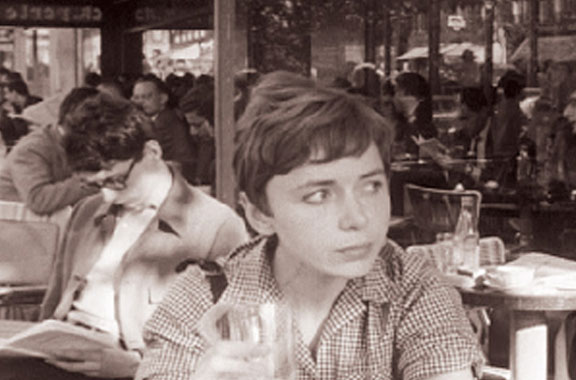
- This event has passed.
Nov 14, 2009 at 7:30 pm
Jackie Raynal: La Nouvelle Vague
With Jackie Raynal
This event is part one of a four part series with Jackie Raynal at UnionDocs, presented with Red Channels. Jackie Raynal present with guests for a discussion following the show.
This first program in the series focuses, of course, on her work with the French New Wave. Raynal edited the short works by Rohmer and Rouch, and the interview segments are clips from a currently-in-progress documentary. The New Wave is not known for its contribution to documentary film; and the major non-fiction works from France during that era are not known for their connection to the New Wave. Let’s try to figure out why.
Raynal began her career in Paris as an editor, working closely and often with Eric Rohmer (1920-) throughout the early 1960’s. She would go on to edit Barbet Schroeder’s omnibus production Paris vu par… (1965), which featured segments by Claude Chabrol (1930-), Jean Douchet (1929-), Jean-Luc Godard (1930-), Jean-Daniel Pollet (1936-2004), Rohmer, and Jean Rouch (1917-2004).
She made her directorial debut in 1962, alongside Étienne Becker (1936-) and Patrice Wyers, on a short documentary project, Merce Cunningham — an early look into the artistic process of Cunningham (1919-2009), John Cage (1912-1992), and Robert Rauschenberg (1925-2008). Towards the end of the 1960’s she was a member of the Zanzibar Group, a radical filmmaking collective, which included a very young Philippe Garrel (1948-). With Zanzibar she produced and edited the films of Patrick Deval, Héraclite l’obscur (1967) and Acéphale (1968); and directed her debut feature, Deux fois (1969).
In 1974, looking for a change of scenery and new filmmaking opportunities, she arrived in New York. After working as an editor here on Jules Dassin’s The Rehearsal (1974) and David Buckley’s Saturday Night at the Baths (1975), she began a relationship with entrepreneur Sidney Geffen (d.1986). The new couple would soon acquire and revamp the Carnegie Hall and Bleecker Street Cinemas, operating two of the city’s most revered, ambitious, and avant-garde “arthouse” theaters (they would both close in the early 1990’s). From the theaters they published a monthly magazine, The Thousand Eyes, which ran listings for all of New York’s repertory programming, and included reviews, articles, essays, and interviews. They also ventured into distribution with Coralie Films, which included titles from the Zanzibar Group, as well as work they wanted to book for the theaters that no other distributors would touch.
Raynal would return to filmmaking in 1981, over a decade since Deux fois, with the autobiographical tale New York Story — later expanded into a feature as Hotel New York (1984) — which featured both her and Geffen as themselves. With bit parts played by Gary Indiana (1950-), Errol Morris (1948-), and Jonathan Rosenbaum (1943-), Raynal reinvented herself as a member of the then-flourishing downtown independent cinema scene, which she championed at her theaters.
Though it wasn’t until the earlier part of this decade that Raynal would begin her most prolific filmmaking stage, due in part to her embracing video technology. She has focused in recent years on a series of video portraiture works, featuring subjects like Jonas Mekas (1922-), Jacques Baratier (1918-), and her own parents in Gougnette (2009).
Nadja a Paris by Eric Rohmer (France, 1964, 13 minutes)
A Modern Coed by Eric Rohmer (France, 1966, 13 minutes)
Interview with Eric Rohmer by Jackie Raynal (France, 2009, 12 minutes)
Gare du Nord by Jean Rouch (France, 2009, 26 minutes)
Interview with Jean Rouch by Jackie Raynal (France, 2009, 26 minutes)
Around Jacques Baratier by Jackie Raynal (France, 2002, 26 minutes)







